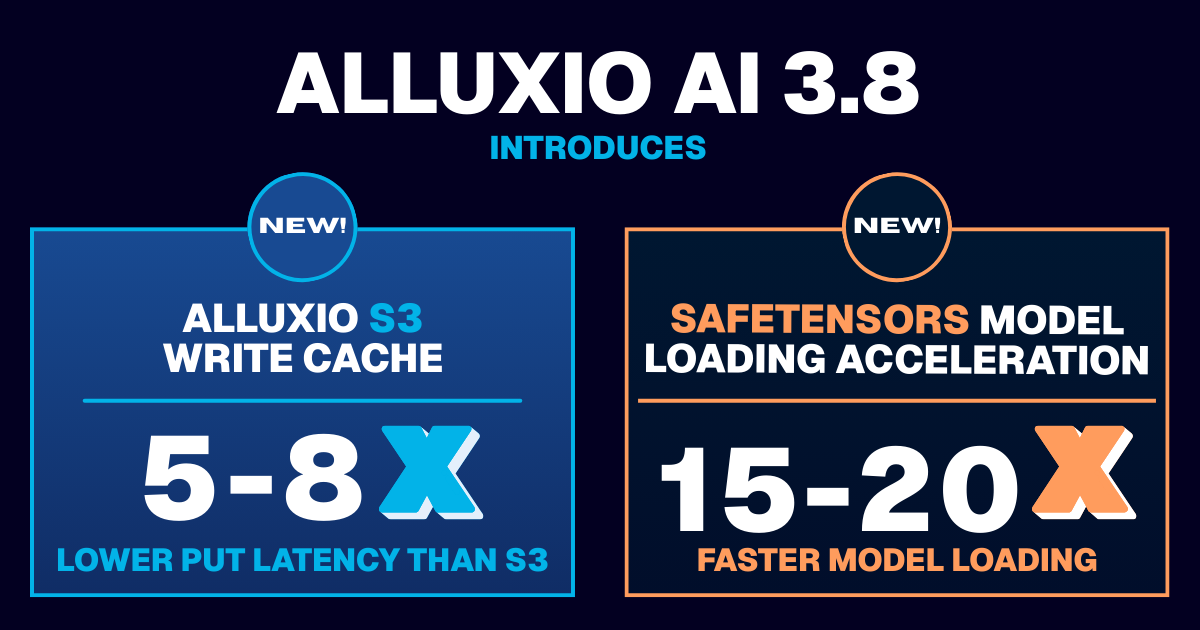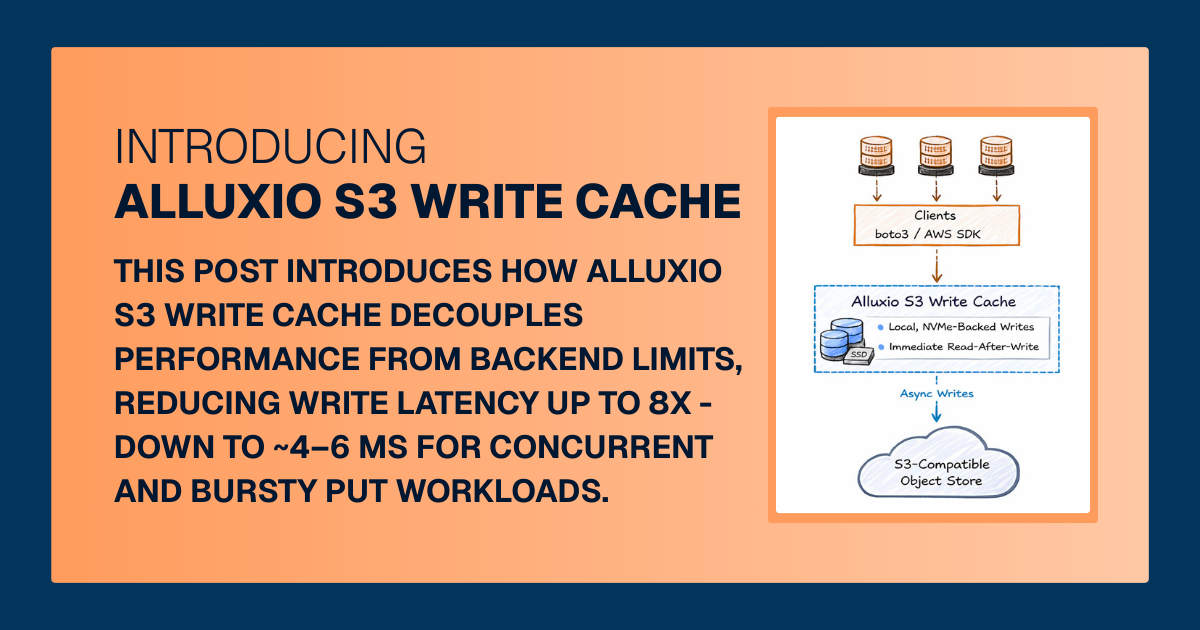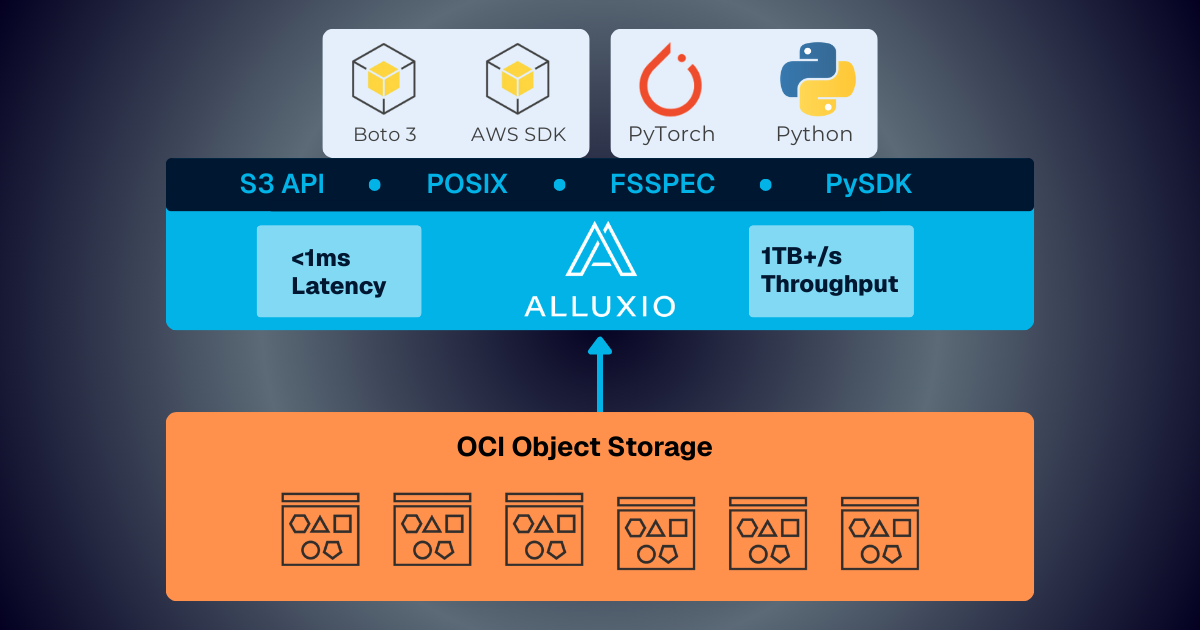Blog

Learn about the new features in Alluxio AI 3.8 designed to eliminate two of the most painful bottlenecks in modern AI pipelines. Introducing Alluxio S3 Write Cache, which dramatically reduces object store write latency and improves write-heavy workload performance, and Safetensors Model Loading Acceleration that delivers near-local NVMe throughput for model weight loading

For write-heavy AI and analytics workloads, cloud object storage can become the primary bottleneck. This post introduces how Alluxio S3 Write Cache decouples performance from backend limits, reducing write latency up to 8X - down to ~4–6 ms for concurrent and bursty PUT workloads.

Oracle Cloud Infrastructure has published a technical solution blog demonstrating how Alluxio on Oracle Cloud Infrastructure (OCI) delivers exceptional performance for AI and machine learning workloads, achieving sub-millisecond average latency, near-linear scalability, and over 90% GPU utilization across 350 accelerators.
.png)
.jpeg)
We are excited to announce the release of Alluxio Enterprise Edition (AEE) and Community Edition (ACE) v1.7.0. This release brings enhanced caching policies, further ecosystem integrations, and significant usability improvements. One highlight is the Alluxio FUSE API which provides users with the ability to interact with Alluxio through a local filesystem mount. Alluxio FUSE is particularly useful for integrating with deep learning frameworks such as Tensorflow.
.jpeg)
In the age of growing datasets and increased computing power, deep learning has become a popular technique for AI. Deep learning models continue to improve their performance across a variety of domains, with access to more and more data, and the processing power to train larger neural networks. This rise of deep learning advances the state-of-the-art for AI, but also exposes some challenges for the access to data and storage systems. In this article, we further describe the storage challenges for deep learning workloads and how Alluxio can help to solve them.

OLAP (on-line analytical processing) technology has been widely adopted by enterprises since last century; Enterprises rely on OLAP to analyze their huge amount of data, generate reporting and so to help business people making decisions. Today in the era of big data, OLAP becomes more important and challenging than ever before; and cloud computing makes this further true. This article introduces how Kyligence, a cutting-edge big data intelligence company, leverages Alluxio to boost their performance in the cloud.

We are excited to announce Alluxio Enterprise Edition (AEE) 1.6.0 and Alluxio Community Edition (ACE) 1.6.0 releases. The AEE release brings a new embedded journal as well as enhancements in the areas of Security and Fast Durable Write. In addition, both the AEE and the ACE releases bring new clients support (Amazon S3 API and Python Client), major usability improvements as well as enhanced integrations with the ecosystem.
.jpeg)
Open source Alluxio 1.5.0 has been released with a large number of new features and improvements. Alluxio allows any application to access data from any storage system transparently and at memory speed. Interoperability with other technologies in the ecosystem is an important step for enabling this, and in the 1.5.0 release, we have improved the accessibility of Alluxio in several key ways.
.jpeg)
We are excited to announce Alluxio Enterprise Edition (AEE) 1.5.0 and Alluxio Community Edition (ACE) 1.5.0 releases. The AEE release brings enhancements in the areas of security, multi-tenancy as well as working with multiple under-stores. In addition, both the AEE and the ACE releases bring major usability and performance improvements as well as enhanced integrations with the ecosystem.

Today, we’re excited to announce our partnership with Mesosphere to enable fast on-demand analytics with Alluxio via Mesosphere’s DC/OS in one-click. This partnership is a natural extension of the synergy between Alluxio and DC/OS. Alluxio, the world's first system that unifies data at memory speed, allows enterprises to manage and analyze data stored across disparate storage systems on premise and in the cloud at memory speed. Mesosphere brings enterprises the power of cloud native technologies, with the control to run on any infrastructure - datacenter or cloud.

Alluxio 1.4.0 has been released with a large number of new features and improvements. This blog highlights some stand out aspects of the Alluxio 1.4.0 open source release: Improved Alluxio Under Storage API, Native File System REST Interface, Packet Streaming
.jpeg)
Deep learning algorithms have traditionally been used in specific applications, most notably, computer vision, machine translation, text mining, and fraud detection. Deep learning truly shines when the model is big and trained on large-scale datasets. Meanwhile, distributed computing platforms like Spark are designed to handle big data and have been used extensively. Therefore, by having deep learning available on Spark, the application of deep learning is much broader, and now businesses can fully take advantage of deep learning capabilities using their existing Spark infrastructure.
.jpeg)
Our mission at Alluxio is to unify data at memory speed. Today we’re excited to unveil our first products which enable organizations to turn data into value with unprecedented ease, flexibility, and speed. We believe our new products will substantially advance Alluxio for both the community and our enterprise customers. In this blog, I will share with you the big data challenges application developers and business line owners face today, and show how Alluxio addresses these challenges.

This is an excerpt from the Accelerating Data Analytics on Ceph Object Storage with Alluxio whitepaper. As the volume of data collected by enterprises has grown, there is a continual need to find efficient storage solutions. Owing to its simplicity, scalability and cost-efficiency object storage, including Ceph, has increasingly become a popular alternative to traditional file systems. In most cases the object storage system, on-premise or in the cloud, is decoupled from compute nodes where analytics is run. There are several benefits of this separation.

Alluxio is the world's first memory-speed virtual distributed storage system that bridges applications and underlying storage systems, providing unified data access orders of magnitudes faster than existing solutions. The Hadoop Distributed File System (HDFS) is a distributed file system for storing large volumes of data. HDFS popularized the paradigm of bringing computation to data and the co-located compute and storage architecture. In this blog, we highlight two key benefits Alluxio brings to a compute cluster co-located with HDFS.
